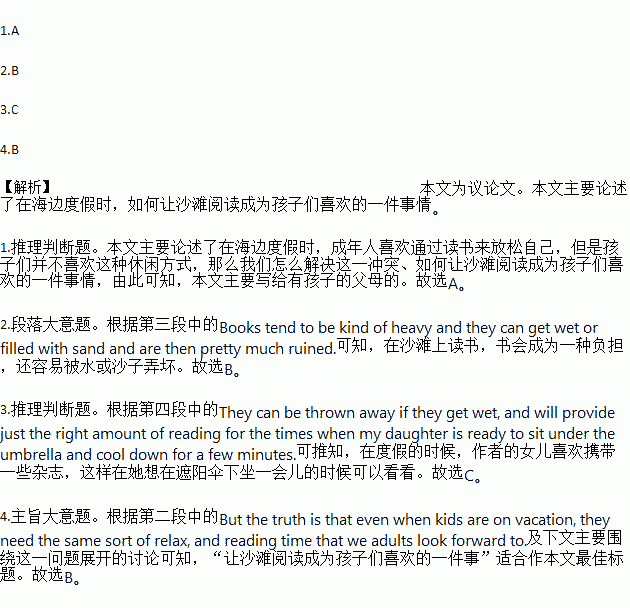题目内容
As an adult, I like nothing better than to sit on the beach reading. Give me a satisfying “beach read” and I’m happy for days. However, I’m sad to say it isn’t really a thing for kids. Most kids would rather take their boards out beyond their parents’ comfort zone than read. And who can blame them?
But the truth is that even when kids are on vacation, they need the same sort of relax, and reading time that we adults look forward to. The trick is getting them to sit for 5 or 10 minutes to refresh their bodies and to enjoy the pleasure of reading.
Books tend to be kind of heavy and they can get wet or filled with sand and are then pretty much ruined. Book chapters tend to be kind of long. Your child may refuse to read. And if your kids are anything like my daughter, they may hate to close a book in the middle of the chapter.
You know what I’m going to say, right? Magazines won’t weigh you down. They can be thrown away if they get wet, and will provide just the right amount of reading for the times when my daughter is ready to sit under the umbrella and cool down for a few minutes. Literary magazines will allow your child to read wonderful fiction paired with beautiful illustrations(插图). Discovery magazines deliver articles on all sorts of topics that will excite and interest your nonfiction lover.
So don’t leave the beach read behind when you pack the beach bags. Slip a magazine or two in the pocket of the bag and when your child needs a few minutes of downtime(休息), pull it out and get them to sit for 10 minutes or so.
1.Who is the text most likely intended for?
A. Parents. B. Kids. C. Travelers. D. Teachers.
2.What does the author really want to say in Paragraph 3?
A. Books become a burden for kids on holiday.
B. Books are not the best choice for “beach read”.
C. Kids don’t spend time reading books on holiday.
D. It’s a pity to throw away the books ruined on holiday.
3.What can we infer about the author’s daughter from the text?
A. She reads thick books during her holiday.
B. She prefers to read some literary magazines.
C. She takes some magazines with her on holiday.
D. She doesn’t want her magazines to weigh her down.
4.What may be the best title for the text?
A. Enjoying Magazines on the Beach
B. Making “Beach Read” a Thing for Kids
C. Making Good Use of Kids’ Time on the Beach
D. Packing Your Beach Bags with Literary Magazines
| A. | service | B. | outside | C. | pioneer | D. | police |
| A. | paid | B. | cost | C. | bought | D. | spent |
| A. | Hopefully | B. | Normally | C. | Thankfully | D. | Conveniently |

